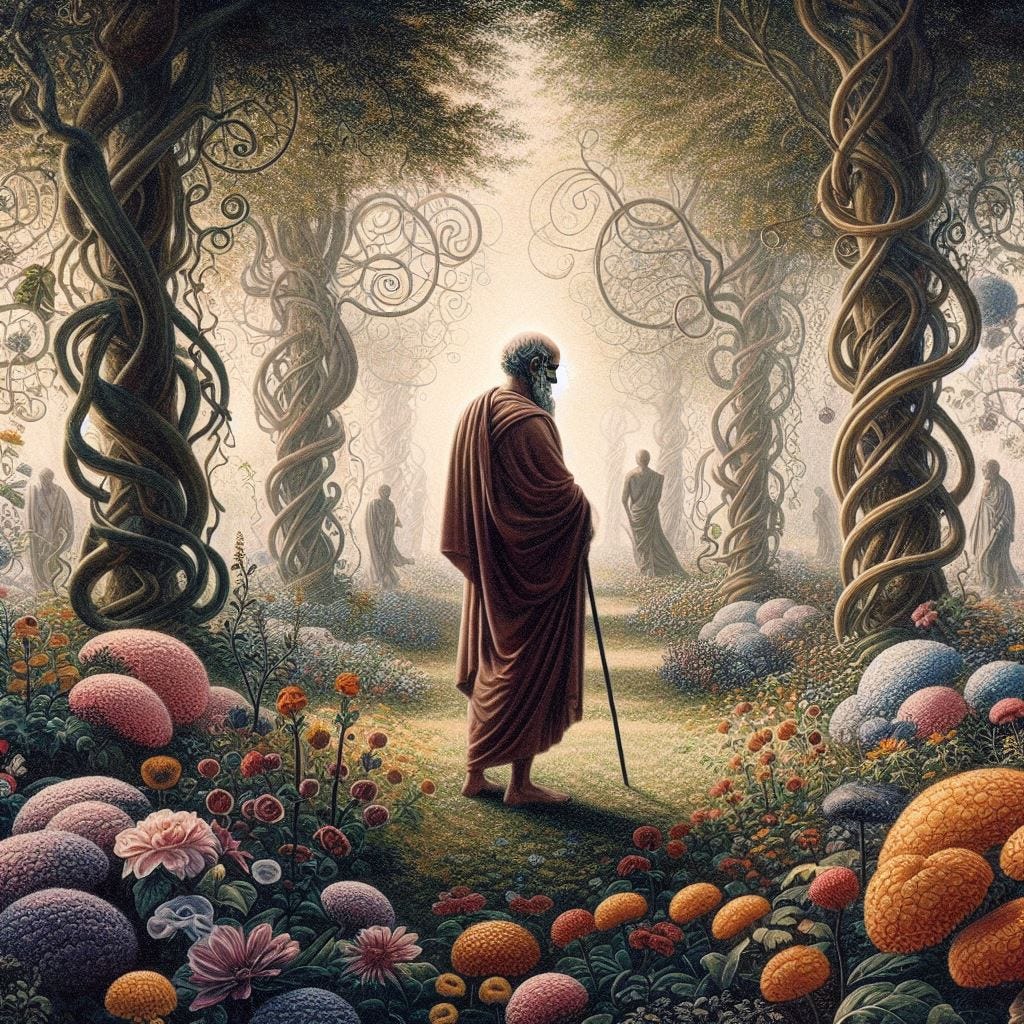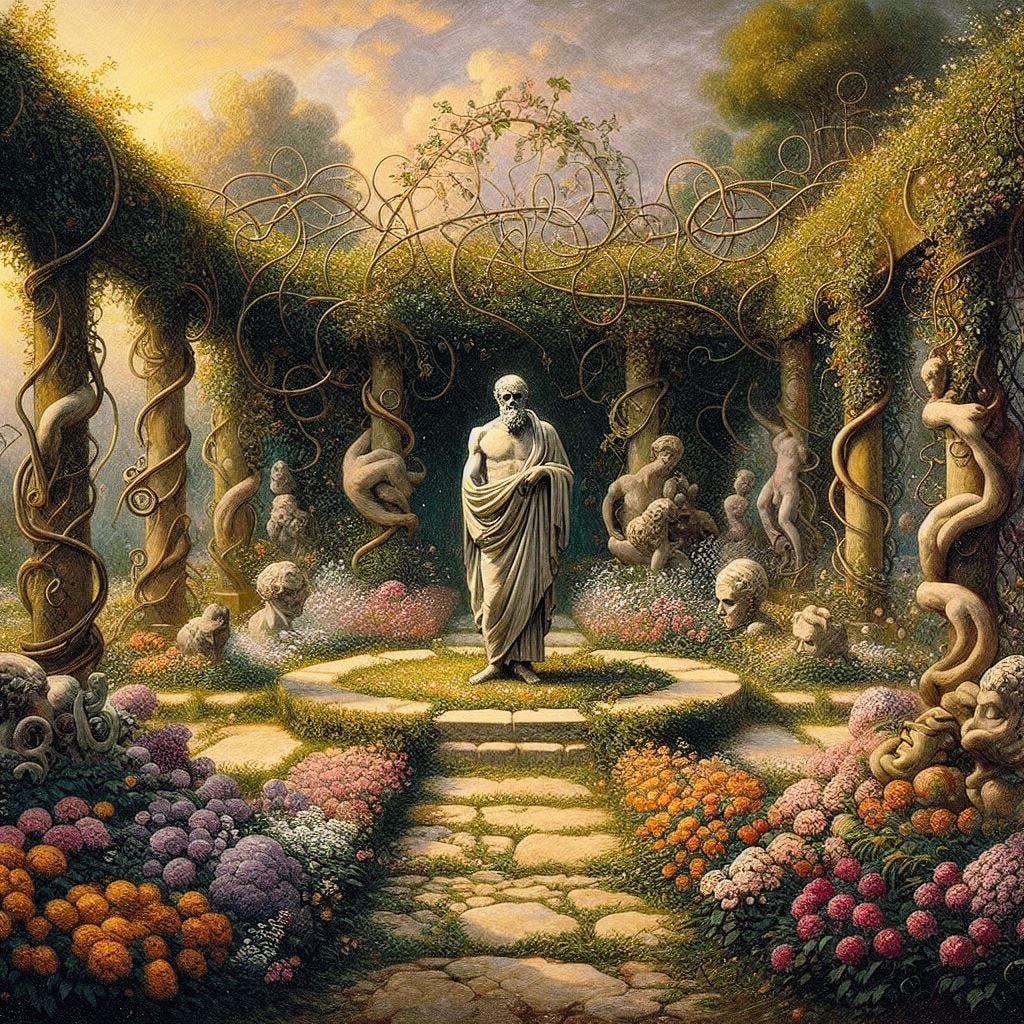The concept of Chaos and Order is associated with Taoism. It’s rather simple: life is divided between Chaos and Order. Too much Chaos is bad, and too much Order is bad. This is a Stoic podcast, sure, but there is much that we can gain by understanding this concept. And there may actually be more overlap than you think.
How can the concept of Chaos and Order be understood through a Stoic lens? And how can we implement this idea in our daily life?
The audio version of this episode is available on Spotify, Apple Podcasts, Stitcher, and wherever else you listen to your podcasts.
Chaos and Order
Let’s begin with some definitions. Order is exactly what you think it is - structure. Rigidity. And Chaos is the opposite - lack of structure. Looseness. Randomness.
If there is too much Order in our lives, we have too much structure. Imagine waking up every morning and doing the exact same thing each and every day. It may get a bit boring, no? Imagine on the other hand that you have no set wake-up time or sleep time, and what you do between waking and sleeping is entirely random.
That wouldn’t be so good, either.
If we have too much Chaos, we are in a constant state of anxiety and stress, yet we never get anything done. If we have too much Order, there are no thrills in life. There are no challenges.
The Stoic Lens
If we were to look at this concept through a Stoic lens, we can quickly see some parallels. Firstly, the dichotomy of control is essentially a dichotomy between Chaos and Order.
That which is up to you is that which you can Order. That which is not up to you is Chaos. In fact, Stoicism is an antidote to dealing with the Chaos in life through the use of Order.
What is up to you? Your thoughts. What is not up to you? What happens to you.
The Stoics suppose that if you do not have any Order in your life, your thoughts will run amuck. You will live in a constant state of Chaos, and that is not good. Put another way, if we do not implement any Order in our lives by taking responsibility for that which is up to us, our life will be entirely Chaos.
You can be sure of one thing: life will give you enough Chaos if you engage with it (in other words, if you are pro-social).
How, then, could one have too much Order if life will always give one Chaos?
It’s simple: if we lock ourselves up.
The Stoics often spoke about how many of us cut ourselves off from humanity.
"A branch cut away from the branch beside it is simultaneously cut away from the whole tree. So too a human being separated from another is cut loose from the whole community.”
Marcus Aurelius
They also spoke about how important it is to be pro-social, to engage with the world. They did not believe in withdrawal from the community; rather, quite the contrary.
In sum: if we are living a Stoic life and not locking ourselves up, there will be enough Chaos in our lives to keep us awake. The Order is what we need to focus on: that which is up to us.
Let’s Get Practical
Your Home
Let’s look at a practical implication of these concepts.
Your home is your sanctuary. It’s where you periodically withdraw from the external world, entering into the shell where you can recover and be with your family. I find it hard to believe that anyone could be happy in a filthy house.
Now: I will put my hand up and admit that my house is not always flawlessly clean. That is a standard that is impossible (especially if you do things like bake bread like I do. Bread crumbs anyone?).
That is a prime example of how if we engage in the world, there will be enough Chaos in our lives. If we clean our homes and never do anything for fear of cleaning up, well, that’s no good!
Imagine you spend a full day cleaning your home. It’s spotless. There isn’t a speck of dust in the house. Your board games are in order, along with everything else. And then a friend comes over. You are reluctant to offer them a drink because you’ll have to place a coaster under the drink, clean the glass afterward, etc. But you do.
Next, you do not want to play a board game like your friend wants because, my God, what a mess that will make.
This is a clear example of too much Order. Your over-cleanliness is interfering with your ability to be pro-social and have fun with your friend.
Now, what about the other end of the spectrum?
Your friend comes over, there are empty, dirty glasses all over the place, your board games are so disorganized and the pieces are all mixed up that it takes you an hour to get the pieces together to play Monopoly, and there is a foul smell in your apartment from that mouldy lemon you left on the counter but refused to throw in the compost?
I don’t think I have to explain how terrible that is.
Finding the Balance
How do we find the balance between Chaos and Order?
In some real sense, we actually have the ability to feel this. We know when we’re balancing Chaos and Order because we are not miserable in our daily lives. We may not be happy all of the time if we are balanced, but we shouldn’t be miserable. We shouldn’t be in a state of quiet desperation.
If we wake up in the morning with a purpose - that’s a good indication that you have an approximate balance.
We could also look at the extremes to give us an indication of when we’ve gone too far. If you are one of the examples from above - your house is way too clean or way too filthy - you may have a problem. If you are withdrawn from the world, that’s a problem. If you are never alone, that’s a problem.
If you find your work boring, you have too much familiarity, not enough challenge, and too much Order. If you are struggling at work and perhaps failing, you may have taken on a job that is too difficult for you right now (too much Chaos).
To go back to the house cleanliness example, ask yourself: would I be embarrassed if someone walked into my house right now? That may mean that you need to do some ordering. But what if no one wants to come to your house because you are too strict? I’m sure we’ve all been to a crazy aunt’s house who has plastic on the furniture.
This is a useful trick - look at the extremes. It’s hard to know if you are perfectly balanced, and you likely never are. But it is easier to consider if we look at the extremes and, if we’re not on either extreme end, then we’re somewhere in the middle, and we may just need to do a bit of tweaking.
Implementing Order
Implementing Chaos is pretty easy: go be pro-social as the Stoics suggest. What about implementing Order in your life?
I know I probably sound like a broken record, but you need some sort of routine. You should get up at about the same time every day, and go to bed at about the same time. You should have blocks of time throughout the day for working, going to the gym, socializing, spending time with family, and so on. And set aside some time for Chaos, too. Give yourself some time to just be. To doomscroll. To YouTube.
Blocking out time for Ordering is simply the best trick in the book. What that looks like is that you may want to spend 10 minutes every morning tidying up your house. Or, heck, use the last 10 minutes before bed. It’s a good winding down practice with no screen lights.
On a weekly basis, perhaps Friday night is your Chaotic night. And perhaps Saturday morning you have to do 30 minutes of cleaning to balance the Chaos.
This is easier said than done. What I’ve found to be a helpful trick is to set a timer, and give yourself time to “tidy”. What that means is that you wander around the house, and when you see something that you would usually ignore (like that book on the mantlepiece that you’ve been meaning to put back on the bookshelf for 2 weeks), you act on it.
When we go about our life, there are these little callings for us to Order our lives.
The remote calls out: “pick me up off the floor”. The bread crumbs whisper: “grab a clothe and wipe me away”. Give yourself a window to listen to that voice!
You can’t all of the time because you need to remove distractions to get work done. but you can do it for 30 minutes. 20 minutes. 10 minutes.
Closing Remarks
This idea of Order and Chaos is incredibly practical. Understand the importance of both, ensure you’re getting enough by being pro-social and setting aside time for Ordering, and use your general feeling of meaning as an approximate input for how close you are to balance.
And when your life feels Chaotic, remember that the Cosmos, the greater whole, is always in Order, and that you can’t help but to ultimately serve the greater whole.
Support the Show
You can expect one free episode of the podcast every single Tuesday. These episodes will either be a 20-minute (or so) solo episode diving deep into a single philosophical topic, or a guest episode, where I bring on incredible guests to chat philosophy.
For the full Strong Stoic experience, I encourage you to consider becoming a paid subscriber. You’ll get access to premium episodes of the Paradoxically Speaking podcast with Joshua Bertolotti, access to my Steps to Success interview series, a bi-weekly exclusive article analyzing a particular quote, and additional benefits from time to time.
***If you’d like to become a paid member but cannot afford it, feel free to contact me directly; I’ll happily provide a complimentary membership (no questions asked).
Stay Connected
Brandon Tumblin is most well-known for his podcast, The Strong Stoic Podcast, where he discusses philosophical ideas (solo and guest episodes).
Brandon is also a writer for THE STOIC, the official journal of The Stoic Gym.








